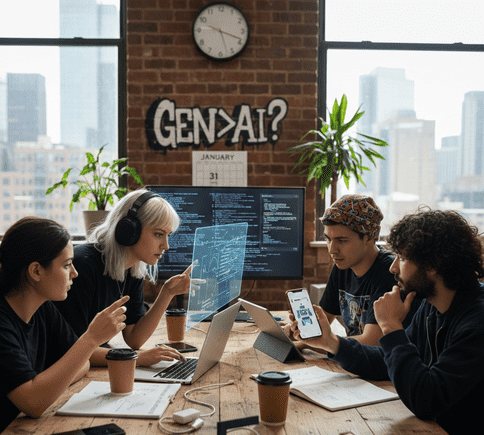Overcoming Technical & Regulatory Hurdles in AI & Blockchain Training Collaborations
Introduction
What’s holding back your AI and blockchain training initiatives? Is it the tangle of divergent regulations?
The complexity of syncing decentralized blockchain systems with AI algorithms?
Or the sheer energy and resource demands of running it all at scale?
As organizations race to adopt AI and blockchain technologies, a new challenge emerges: preparing talent for this dual revolution. But building robust training programs around these powerful tools is not as easy as it sounds.
The fusion of artificial intelligence with decentralized blockchain networks introduces a complex web of technical and regulatory barriers. From scalability issues to inconsistent global regulations, AI blockchain training challenges are real and growing.
Yet, some forward-thinking organizations are cracking the code. They are creating blockchain education partnerships that not only tackle these obstacles head-on but also set new standards for future-ready training solutions.
While these successes are promising, they remain the exception rather than the norm. Let’s explore what’s holding most collaborations back. We will also look into how successful partnerships are navigating these hurdles with strategy, foresight, and innovation.
Power and Complexity of AI Blockchain
AI and blockchain are among the most transformative technologies of our time. AI enables machines to learn, reason, and act, while blockchain offers transparency, decentralization, and security. When combined, the potential is enormous, from fraud detection and supply chain optimization to decentralized identity and autonomous agents.
But in the training space, this convergence poses significant challenges:
- Overcoming Technical Barriers:
Integrating AI’s data-heavy models with blockchain’s distributed architecture requires overcoming technical complexity that most training infrastructures aren’t prepared for. Traditional systems can’t efficiently support smart contracts that trigger machine learning actions or store vast training datasets on-chain.
- Scalability Bottlenecks:
Blockchain networks, especially public ones, are notoriously slow and energy-intensive. Training real-time AI models on blockchain is challenging. Slow speeds, limited capacity, and high transaction costs make it even harder to build strong education partnerships.
- Energy Consumption Issues:
Both AI and blockchain demand high computational power. Training large models consumes massive energy. And combining this with proof-of-work blockchain systems amplifies the sustainability concern. This raises flags not just operationally, but ethically too—especially for institutions promoting green initiatives.
- Regulatory Compliance in AI and Blockchain:
AI and blockchain operate in highly fragmented regulatory environments. While GDPR and the AI Act regulate data and algorithms in Europe, blockchain remains in a grey area in many regions.
For global training providers, keeping up with varying compliance requirements is a full-time job. Navigating regulatory compliance in AI without violating regional blockchain norms is a tightrope walk.
Real-World Friction in AI Training: Collaboration Issues
Training collaborations across organizations, universities, and enterprises often fail due to:
- Lack of Interoperability: AI models built on centralized data frameworks don’t mesh well with decentralized blockchains.
- Disagreements on Data Ownership: Who owns the training data in a decentralized system? The creator, the trainer, or the node operator?
- Inconsistent Standards: No universal framework governs AI blockchain training standards, leaving each partnership to create its playbook.
- Infrastructure Gaps: Many training organizations lack the tech stack needed to simulate real AI-blockchain interactions.
These challenges make it clear: AI training collaboration issues go beyond content. They strike at the core of infrastructure, compliance, and operational capacity.
How Leading Partnerships are Making It Work
Some organizations have managed to rise above the fray. Here’s how they do it:
- Layer 2 Blockchain Integration:
To bypass scalability bottlenecks, savvy training partners are integrating Layer 2 blockchain solutions like Polygon or Arbitrum. These dramatically reduce latency and transaction costs. These solutions also help simulate real-world blockchain environments without compromising on speed or scale.
- Federated Learning Models:
Instead of centralizing data, leading institutions use federated learning, a privacy-first method. The models are trained across multiple devices or servers holding local data samples. This aligns perfectly with blockchain’s decentralized ethos while respecting data privacy.
- Adaptive Compliance Frameworks:
Smart organizations are embedding adaptive legal frameworks into their programs. These frameworks can automatically detect and adjust to local regulations, helping global blockchain education partnerships stay compliant.
- Green Protocol Adoption:
Eco-conscious training providers are moving away from proof-of-work chains and opting for energy-efficient blockchains like Algorand or Tezos. These greener protocols enable AI model testing with lower carbon footprints.
- Standardized APIs and Toolkits:
To minimize AI training collaboration issues, many successful alliances now use standardized APIs and toolkits. These promote interoperability between blockchain environments and AI systems.
How Leading Partnerships are Making It Work
Organizations like AI CERTs® understand the unique pain points in merging artificial intelligence and blockchain for training. We don’t just offer certifications; we build ecosystems where partners can:
- Access a turnkey training infrastructure designed for decentralized learning.
- Navigate regulatory compliance in AI and blockchain with expert-curated legal guides.
- Integrate with interoperable toolkits to overcome technical barriers.
- Co-create blockchain education partnerships that deliver measurable impact.
- Leverage advanced AI models tuned for industry-specific learning journeys.
By becoming a training partner with AI CERTs®, you will be tapping into a network that’s actively solving the real-world AI blockchain training challenges.
Trends Shaping the Future of AI & Blockchain Training
As the demand for skilled professionals in AI and blockchain continues to surge, training providers must align with the following trends:
- Decentralized Credentialing: Blockchain-based certifications and learning records will become the norm, validating skills across borders in a trustless environment.
- Micro-Modules for Regulatory Shifts: Future training will include agile, short-term courses focused on region-specific laws as they evolve.
- AI-Powered Learning Analytics: AI will drive deeper personalization in blockchain education partnerships, offering real-time feedback and adaptive learning paths.
To stay ahead, training organizations must not just teach AI and blockchain but live the technology. The goal should be to integrate its principles into the way they deliver and measure training.
Final Thoughts
The integration of AI and blockchain is not just a technology play—it’s a training imperative. But without the right strategy, partnerships risk getting stuck in regulatory red tape, energy inefficiency, or scalability woes. Overcoming technical barriers and aligning with dynamic legal landscapes demands more than vision; it demands a trusted partner.
Don’t let technical, regulatory, or infrastructure hurdles slow your AI and blockchain training goals.
Partner with AI CERTs® – your launchpad for scalable, compliant, and future-ready education delivery.
Recent Blogs

FEATURED
AI Training — What Are the Supply-Side Implementation Challenges?
January 31, 2026
FEATURED
ATPs’ Plan for Penetration of AI Literacy as a Baseline Competence
January 31, 2026
FEATURED
Skills Deficiency but a Productivity Paradox — How ATP Reduces the Complexity
January 31, 2026
FEATURED
Gen Z’s Complex Relationship with AI Training
January 31, 2026
FEATURED
Organizational Confidence Is Low in Skill Building — What ATP Will Fix
January 30, 2026

